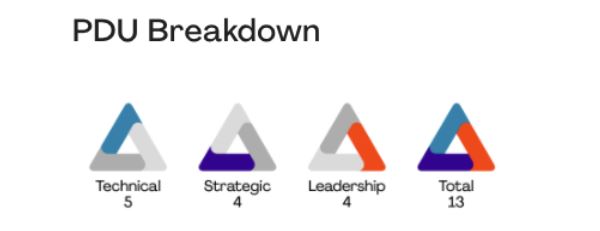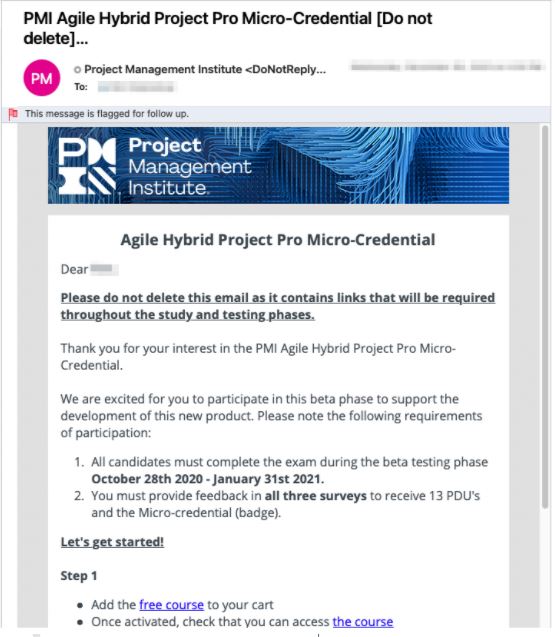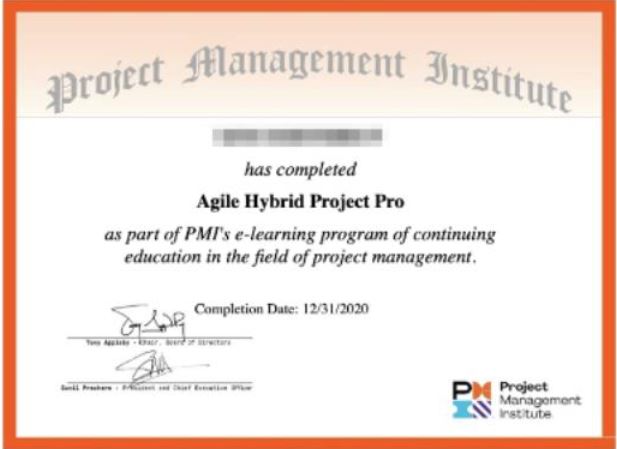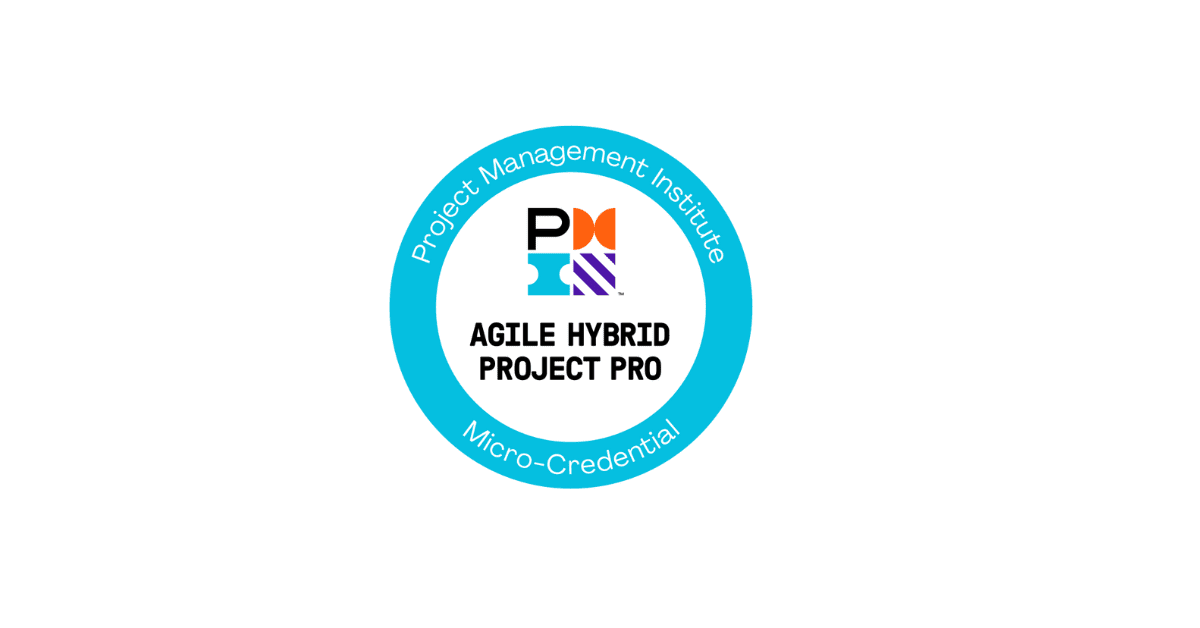Resumen ejecutivo
En lo que puede ser un guiño a la realidad de que puede que no haya pura "cascada" o "ágil" en el mundo, el PMI lanzó una "micro-credencial" para Agile Hybrid Project Pro. Parecía intrigante, así que dediqué una tarde a repasar el curso y el examen para ver de qué se trataba y si merecía la pena la inversión.
La cambiante estrategia de formación del PMI
For those not familiar, PMI has totally changed up its certification game, doing away with its previous Registered Education Provider (R.E.P.) program and replacing it with its Authorized Training Provider (A.T.P.) program. There are a number of differences, but the key one is that the program pulls back ownership of PMP prep material to PMI, rather than leaving it to the providers to develop.
When I spoke with PMI about the program change, they shared that they received feedback from the community that some of the PMP prep content wasn’t doing a good job of preparing PMP applicants. I can see their point – I’ve reviewed content developed by multiple providers, and I’ve been through countless banks of test questions and totally agree that they are not consistent. So, PMI decided that all PMP prep courses should be delivered using content they (PMI) developed. This plan is good for consistency – and also good for PMI’s top-line revenue which makes for a healthy PMI. As a training provider, I have to say it is also nice to not have to try to build that training content myself and keep up with PMBOK updates or buy it from a third party.
Microcredenciales
In line with developing and marketing more of its own training content, PMI has launched a line of micro-credentials with an aim to “certify achievements in specific skills, knowledge, and competencies by focusing on unique subjects and topics.” These credentials are not as monumental an undertaking as PMP or PMI-ACP but still come with the legitimacy of a PMI-provided credential. In addition to the Agile Hybrid Project Pro, there is also an Organizational Transformation Foundation micro-credential and a Citizen Developer micro-credential.
For at least the Org Transformation and Citizen Developer credentials, these are the first in a series on each topic. These are great ideas in the respect that they fit the more modern learner’s need for self-paced training for specific subject matter on demand. They are also a smart way to test the market for training content and find more creative ways to add content.
Pricing is interesting – the Agile Hybrid micro-credential goes for $175, the Organizational Transformation Foundation micro-credential goes for $199 and the Citizen Developer course for $249 – so there is a wide spread in price. With these and more on the way, I could see PMI’s traction from micro-credentials eventually rivaling what they take in from their marquee credentials.
Proyecto Ágil Híbrido Pro
Per PMI, this credential is “ideal for traditional project managers who are beginning to venture into the Agile or Hybrid space… [this credential] verifies your skillset and increases your value to employers.” So, of course, I couldn’t resist.
-

PDU breakout for Hybrid Agile Project Pro
And of course… 13 PDUs!
The content outline is provided here. Like the PMI-ACP and PMP, reference material for the credential is not limited to PMI content but extends to other content in the market. Even without reviewing all this content, if you have some hybrid delivery experience and go through the online course, you should fare well on the exam.
Inscríbase en
The signup process is pretty straightforward from the credential page. Once you sign up, you get an email that you have to hang on to, because it’s the one with the working links to the course. I received another email after all the setup was complete for my e-learning page that didn’t show the course – but I could get there using the link in the initial email I received. So, hang on to the email just in case.
-

PMI Hybrid Project Pro Micro-Credential Email
El curso
Having spent years delivering PMP prep training, this course was a refreshing change. The online self-paced course has 20 modules, each of which is presented through a relatable, real-world use case. These modules follow the same format as the content outline. Each lesson links back to Tools & Techniques from the PMBOK or PMI’s Agile Practice guide and also provides links back to PMI’s extremely deep Resource library. I’ve never explored PMI’s Resource Library before but was surprised at the depth and breadth of the content there. When I should have been focusing on my Hybrid Agile course, I found I kept following resource links and going down the rabbit hole in the library. My advice here is to save the interesting links for exploration after you finish the course, so you don’t get distracted like me 🙂
Cada módulo tiene un breve cuestionario para reforzar el tema. Los cuestionarios funcionaban bien, salvo que había un tipo de pregunta, una especie de "buscador de categorías" para algunos temas, en el que había que arrastrar y soltar frases (hasta 9) a la categoría correcta. O lo haces todo bien o lo haces todo mal, y las pistas sobre dónde podrías haberte equivocado eran un poco crípticas, lo que resultaba frustrante. Hubo un par de estas preguntas en las que finalmente me rendí y seguí adelante.
El contenido
Al tratarse de un curso de Agile Hybrid, esperaba que hubiera más contenido en torno a las tuercas y los tornillos de hacer que los proyectos híbridos funcionen respondiendo a las preguntas:
- ¿Cómo se gestionan las dependencias cuando hay varios equipos ágiles que entregan varias partes de una solución?
- ¿Cómo se coordinan los calendarios de diferentes equipos ágiles que pueden tener diferentes metodologías y diferentes ciclos de sprint o duraciones?
- ¿Cómo trabaja un PM con un Product Owner para integrar los entregables específicos del proyecto en un backlog general del producto?
Pero el curso no llegó a ese nivel de detalle técnico.
The course focuses more on the people side of working with Agile (managing conflict, leading a team, and engaging virtual teams). The parts which did touch on technical processes (plan and manage schedule, plan and manage scope) were pretty high level – perhaps in an effort to keep the course methodology agnostic. But still quite useful for getting you aligned with agile ways of working.
En general, diría que este curso sería más útil para un PM establecido que necesita adoptar una mentalidad "ágil" para ayudar a entregar proyectos híbridos y necesita entender cómo funciona ese mundo.
El examen
Una vez completado el curso, se realiza el examen a través de Pearson Vue. Se trata de un examen a distancia no dirigido, cronometrado, con 60 preguntas de opción múltiple. El examen se parece un poco a un PMP, en el sentido de que las preguntas de opción múltiple son a menudo situadas, y tienes que tener una buena idea de cómo el PMI quiere que pienses para elegir la respuesta correcta. Eran lo suficientemente desafiantes como para que, al hacer el examen, no estuviera seguro de si el curso me había preparado para pasar el examen. Pero aprobé a la primera, así que ahí lo tienes.
-

Diploma de microcredencial de proyecto híbrido Pro
¿Mereció la pena?
It’s the only “Hybrid Agile” credential that I’m aware of, right now. I think it’s cool and I look forward to putting the badge on my LinkedIn profile. The micro-credential format may be a response to other training competitors like LinkedIn Learning and Google’s certs. It’s great to see PMI jump in the fray and start putting out accessible content. And it’s high-quality content as you might expect. Plus, it’s a PMI credential that an experienced PM can knock out in an afternoon, so it’s nowhere near the commitment of a PMI marquee credential.
Creo que las lecciones basadas en escenarios del curso en línea fueron la mejor parte del proceso, ya que hicieron que el contenido se relacionara y me ayudaron a reforzar algunos principios y enfoques ágiles. Espero que esta credencial sea un indicador de cómo el PMI impartirá la formación en el futuro.
Is this credential going to teach you how to execute Hybrid Agile projects? Not really. It’s a good start for getting in the right mindset, but don’t look for it to give you the technical ins and outs of how to get your projects done in a hybrid world. Is it worth $175? It may be if you need to demonstrate that you understand Agile Hybrid on your LinkedIn profile. If you’re already there and have the ‘street-cred’ of having worked on Hybrid projects, it may not be super useful. That said, if you do work in a Hybrid world and need to take a course to keep up your PMP, it was a nice way to get 13 PDUs. And coming from a background as an ‘old school’ PM, coursework that helps me develop more of an Agile mindset is good medicine.
Y, aunque esta credencial no sea para ti, no pierdas de vista la evolución del espacio de microcredenciales del PMI. Podríamos ver algunas cosas realmente interesantes en este espacio.
Consulte otros artículos y opiniones aquí.
